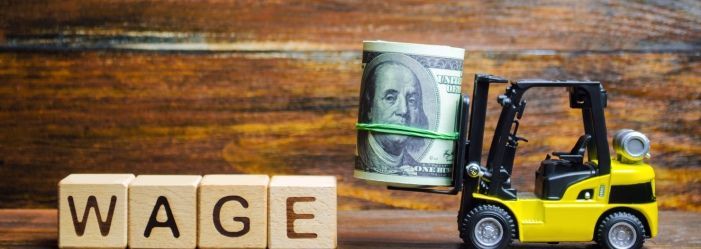Last Updated: January 29, 2024
Minimum Wage Workers will Finally Have an Increase

California Governor Gavin Newsom announced recently that, despite the ongoing pandemic, minimum wage workers will see an increase to $14 per hour for businesses employing more than 25 people and $13 per hour for businesses with fewer than 25 people. This increase will begin on January 1, 2021.
Minimum Wage Increases
The governor could have suspended the increase due to the pandemic, but he decided that it was more important for minimum wage workers in essential jobs at hospitals and nursing homes, grocery stores and those caring for children to benefit from what will soon be an improving economy.
Other Benefits Are Available
If you file income tax (and you should, just to reap these benefits), you may be eligible for the California Earner Income Tax Credit and the Young Child Tax Credit. This program has returned more than $1 billion to more than 3.6 million California families. The Earned Income Tax Credit ( CalEITC) has been expanded to include families making up to $30,000 per year. The Young Child Tax Credit, started in 2019, is available to families with children under age 6.
Possible Unemployment Benefits
California lawmakers are considering adding a $600 weekly unemployment benefit to fill in as the federal government’s unemployment benefits expire and additional benefits are bogged down in the federal legislature. Without this unemployment benefit, unemployed Californians may be cut to $340 per week, bringing additional hardships particularly to minimum wage workers in California.
It has been a tough road for Californians and any debt relief will help. Click here for more information on California debt relief.
Extra Income
If any of this represents extra cash that is not earmarked for necessities, what should you do with the money?
If any of this represents extra cash that is not earmarked for necessities, what should you do with the money?
First, be aware that lawsuits related to credit card debt appear to be rising due to the pandemic. If you have outstanding credit card bills, you may want to pay down the balance.
Another option for your tax income is to put it into savings. If you’d like information on different types of savings account strategies, click here for information on emergency savings and retirement savings.
If you want to have a savings account, but you have debt, what should you do first? Check out our article that addresses when to save first and when to pay off debt first.
Practically every financial expert will tell you that a budget is the most important first step to taking control of your finances. If you are just getting started, one of the apps, worksheets or programs discussed in What’s the Best Free Budget Planner may work well for you.
If penny by penny budgeting is not your thing, you might have more success with the 50-30-20 budget, a simple percentage based budget practice that can help you see where your money is going without as much tracking as a standard budget would require.
As you read through some of the links in this article, you might find other articles that can help you understand different ways to become debt free.
Great, But I am Still in Debt?
Sometimes, not all the advice and tax credits available can help you with your debt situation. There are solutions out there. We discussed some of them on the debt relief page for California residents, but you may want to look at the following options:
- Debt Consolidation can roll all debt into a single, lower interest payment. You may be able to get a lower interest loan to pay off the debt, or work with a debt consolidation company.
- Credit Counseling helps you to manage your money including developing a budget, understanding your credit report and setting up a debt management plan.
- Bankruptcy is a last resort option – this legal action can wipe out most of your debt, damages your credit for up to ten years, and may be expensive and time consuming.
- Debt Settlement negotiates with creditors to lower the debt amount of unsecured loans, like credit cards, and helps you to save money in order to pay off loans. There is a credit impact if your score is high, but you will save money versus what you are currently doing and this option is faster than the others, excluding bankruptcy.
If you’d like more information about each of these, talk to one of Pacific Debt, Inc.’s award-winning debt specialists. They will look over your unique situation and explain all your options. If you qualify for Pacific Debt’s settlement program, you can start immediately. If it is not the correct program for you, you will be referred to one of our trusted partners.
You generally need more than $10,000 of unsecured credit card debt and exhibit signs of financial hardship to qualify for Pacific Debt’s program. However, the debt specialist will be able to best answer your questions about your unique situation.
New Minimum Wage Laws in California
In 2023, California passed two laws significantly raising minimum wages for workers in select industries.
Effective April 2024, fast food workers at chains with over 60 locations nationwide will earn at least $20 per hour. This increase impacts an estimated 565,000 fast-food workers across the state.
Additionally, new minimums for healthcare workers will take effect in June 2024. Workers at hospitals, dialysis clinics, nursing homes, and other facilities will see minimum pay range from $18 to $23 per hour depending on employer and location. Around 400,000 healthcare workers are expected to receive raises under the new law.
These industry-specific hikes aim to improve conditions for some of the state’s lower-paid workers. However, they raise concerns about impacts on consumer prices as employers pass on higher labor costs. Some major fast-food chains have already indicated plans to raise menu prices in 2024 to help offset the increased wages.
It’s also likely these new minimums will pressure other low-paying employers to raise wages to compete for talent in California’s tight labor market.
Budgeting Tips
When creating your first budget, an app like Mint, PocketGuard or EveryDollar can help simplify the process. They securely connect to your bank accounts to automatically categorize spending and provide summaries of where your money is going.
The 50/30/20 budget is another popular way to divide up your expenses:
- 50% to Necessities: housing, food, transportation, minimum debt payments
- 30% to Lifestyle: dining out, entertainment, travel
- 20% to Financial Goals: building savings and paying off debt faster
Having trouble sticking to a budget? Try these 3 simple tips:
- Set calendar reminders to review your budget weekly or monthly to stay on track.
- Cut unnecessary expenses that don’t align with your financial goals. Small daily savings add up.
- Find a budget buddy - talk openly about budgets and debt with a trusted friend or family member to stay motivated.
FAQs
Conclusion
For many California residents, debt and low wages make it difficult to afford the state’s high cost of living. The recently enacted minimum wage increases for fast food and healthcare workers aim to improve conditions for some of the lowest-paid employees.
However, effects like higher consumer prices may diminish the impact. On average, Californians have almost $9,000 in credit card debt and high student loan burdens to contend with as well. Creating a budget is essential to account for the state’s expenses. Useful mobile apps simplify the process and popular methods like the 50/30/20 model are easy starter options.
Getting finances on track is a crucial piece of building a more secure financial future in California. Additional online resources provide in-depth help for further developing skills like budgeting while dedicated financial advice can help create personalized plans for reducing debt and increasing income.
Why should you choose Pacific Debt, Inc?
About Pacific Debt, Inc.
Pacific Debt, Inc is one of the leading debt settlement companies in the US and we have settled over $300 million in debt for our customers since 2002.
If you’d like more information on debt settlement or have more than $10,000 in credit card debt that you can’t repay, contact Pacific Debt, Inc. We may be able to help you become debt-free in 2 to 4 years.
Pacific Debt, Inc has been consistently named one of the best debt settlement companies for years. In 2020, we were proud and honored to have earned two #1 rankings for our customer service.
Pacific Debt is currently providing debt relief coverage in the following states:
Alabama, Alaska, Arizona, Arkansas, California, Colorado, District of Columbia, Florida, Idaho, Indiana, Kentucky, Louisiana, Massachusetts, Maryland, Michigan, Minnesota, Missouri, Mississippi, Montana, North Carolina, Nebraska, New Mexico, New York, Oklahoma, Pennsylvania, South Dakota, Texas, Utah, Virginia, Wisconsin
* Other states can be connected to one of our trusted partners
For more information, contact one of our debt specialists today. The initial consultation is free, and our debt experts will explain your options to you.
Disclaimer: Pacific Debt, Inc. is not a law firm and this article should not be construed as legal advice. Only a licensed attorney in your state can provide legal advice.
Reduce Your Credit Card Debt By Up to Half

BBB Reviews | 4.9/5.0 Rating









 Do Not Sell My Personal Information
Do Not Sell My Personal Information